This page introduces our environmental contributions and activities for biological diversity conservation.
Environmental Initiatives
Basic Policy on Environmental Information Disclosure
The Advantest Group discloses information on environmental burdens and
environmental protection activities by including such information in
our reports and website, holding exhibitions, and so forth.
We believe it is important to share environmental information with our
stakeholders and to reflect such information in our environmental
management in order to continuously grow as a company without
compromising our integrity.
We also engage in communication with local communities through various
environmental protection activities.
Number of environmental compliance initiatives
-
*Aggregation scope: Advantest Group
Environmental Information Disclosure
Environmental Contribution Activities
We endeavor to foster communication with a variety of stakeholders through environmental contribution activities.
Food recycling
Having updated the food composter machines in September 2020, the Gunma R&D Center engages in food recycling by composting kitchen waste from the employee cafeterias of three facilities in Gunma and Saitama prefectures. Processed garbage is converted into compost, which is provided to interested employees free of charge. After the compost matures, it is used to grow vegetables on our farm, which stretches over approximately 2,000m2 of the premises of the Gunma R&D Center. On our farm, employees of Advantest Green grow pesticide-free vegetables throughout the year, and harvested vegetables are used in dishes served at the cafeterias run by Advanfacilities. We also make these vegetables available to our employees to purchase.
Advantest thus promotes employee health while reducing food waste and implementing food recycling in collaboration with affiliated companies.
the Gunma R&D Center
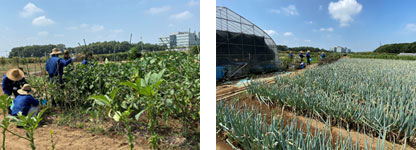
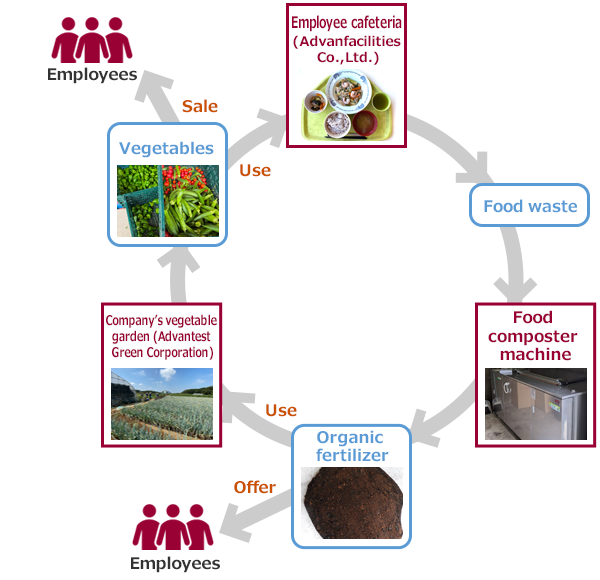
Environmental Impact Assessment
Advantest records and assesses the environmental burden on the area
surrounding its business establishments, such as office waste water,
in accordance with ordinances and pollution control agreements.
In addition, we are managing plants and cultivating biotope at our
business establishments while considering biodiversity.
Initiatives for Biodiversity
As stated in the “Third Mid-term Management Plan (MTP3, FY2024-2026)”, Advantest is developing initiatives for biodiversity with a focus on contributing to a sustainable global environment. Having recognized the importance of biodiversity in supporting a prosperous and healthy society, we will work to meeting the needs of the present without compromising the ability of future generations to meet their own needs, based on the “Advantest Group's Guidelines of Action for Biodiversity”. Meanwhile, we will also work to expand the value we provide to our stakeholders in a balanced and multifaceted manner.
In addition, through our biotope established at the Gunma R&D Center, which is one of the largest biotopes of any private company in Japan, we will strive to earn the trust of our stakeholders by communicating with local residents, learning about the importance of the global environment, and further strengthening our awareness of our contribution to a sustainable global environment.
The Advantest Group's Guidelines of Action for Biodiversity
To show our gratitude for the gift of nature created by biodiversity, and to recognize the significance of biodiversity in supporting the prosperity and the wellness of our society, the Advantest Group will carry out initiatives in conserving biodiversity and in contributing to the sustainable use of biological resources.
-
1.Understanding Environmental Impact
We identify, evaluate and share information on any aspect that may have a significant impact on biodiversity in the entire lifecycle of our business activities. -
2.Understanding Biodiversity
We increase awareness and understanding of biodiversity among all employees so that they are able to engage in activities that give consideration to biodiversity in their business activities and daily lives. -
3.Reduction of Environmental Impact
By seeking highly effective measures, and by carrying them out continuously, we reduce the impact of our business activities on biodiversity. -
4.Cooperation with Stakeholders
We cooperate with a variety of stakeholders such as the government, educational organizations, NPOs, local residents and our business partners to promote activities related to the conservation of biodiversity.
Participation in the 30by30 Alliance for Biodiversity
Since April 2022, Advantest has joined the 30by30 Alliance for Biodiversity, a coalition of volunteer companies incorporated in the 30by30 Roadmap formulated by the Ministry of the Environment.

Initiatives for the Biotope
Reflecting our commitment to living in harmony with nature, Advantest established a biotope in Gunma R&D Center in 2001 with the aim of helping to recreate the original, natural landscape of the Kanto Plain, a landscape that is being lost to development. This biotope, with a total area of 17,000 m2, is one of the largest of its kind established by any private company in Japan.
Advantest's biotope provides a venue in which Advantest employees can learn about the importance of protecting the global environment; the biotope is also used as a way to foster communication with local residents. More than 20 years have passed since the establishment, and the biotope now has an optimal environment for preserving the local ecological system and is playing a great role in protecting and growing threatened species. In addition, Advantest's biotope provides an ideal environment for achieving an SDG target, "Goal 15: LIFE ON LAND".
-
*Biotope: This word combines the Greek words "Bio", which means life, and "Tope", which means a place.
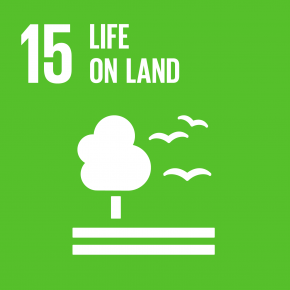
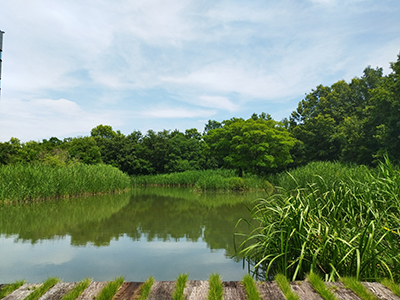
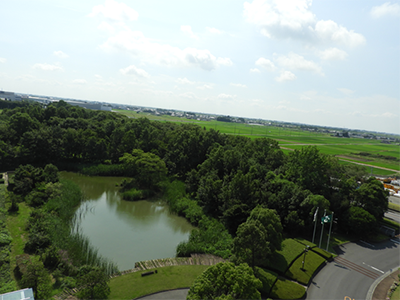
Participation in Gunma Biotope Forum
Advantest has been participating in the Gunma Biotope Forum since 2017. This forum is organized by Professor Shin-ichi Ishikawa, Faculty of Information Science, Gunma University. Under his guidance and advice, companies and organizations in Gunma Prefecture that are engaged in biodiversity conservation gather to share information and opinions.
The fiscal 2024 forum was held at the Kanto Plant (Tatebayashi City, Gunma Prefecture) of Toyo Suisan Kaisha, Ltd. on October 28. A total of 20 representatives from member companies, organizations, and Gunma University participated in the forum, reporting on their biotope-related activities and exchanging opinions. Advantest made a presentation on our biotope, including its plant and animal monitoring survey, use of fallen leaves and dead branches, our own farm, and the role of employment for people with disabilities.
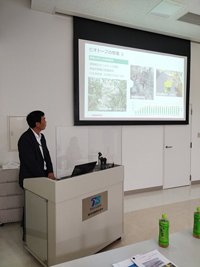
Biotope videos released
Advantest began making videos of our biotope and publishing them on our website since fiscal 2022. The videos introduce the biotope that is rich in nature, with beautiful aerial images taken by a drone of the indigenous flora and fauna that live there. These images help communicate the biodiversity of our biotope, that leads to securing a nature-positive world, to our stakeholders in an easy-to-understand manner.
Please click on the Biotope Quarterly link below to watch the biotope videos.
Place for the protection and cultivation of valuable plants
Since its establishment in 2001, our biotope has been dedicated to research on, protection of, and cultivation of the animals and plants that live there as well as the extermination of alien species under the guidance of Gunma University. We also utilize our biotope in our efforts to protect and cultivate Eupatorium japonicum and floating heart, which are national near-threatened species and Gunma prefectural IA endangered species.
With regard to Eupatorium japonicum, there are only five places where it grows naturally in Gunma Prefecture, one of which is Advantest's biotope. Advantest has been continuing these protection and cultivation activities for many years, which have led to the creation of an environment that enables the stable natural cultivation of the native plant.
With regard to floating heart, there is only one place where it grows naturally in Gunma Prefecture, and Advantest's biotope has been used as an evacuation shelter since 2012, where floating hearts grow steadily.
Moreover, from fiscal 2019, Advantest implemented emergency protection measures for native Amsonia ellipticas, which were specified as a threatened species (IA) in Gunma Prefecture, and started protection and cultivation activities for them.
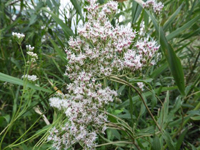
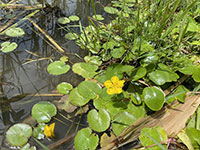
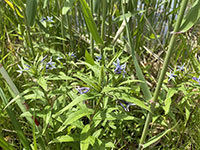
Results of Monitoring the Floral Biodiversity in 2023 in Joint Research Project with Gunma University
Collaborating with Professor Shin-ichi Ishikawa, Faculty of Information Science, Gunma University, we have been monitoring the floral biodiversity of our biotope annually since 2001. In the 2023 survey, 158 plant species (120 native and 38 non-native) were found to be growing in the biotope, indicating that the flora is being maintained in a stable manner. An endangered species, Eupatorium japonicum have been growing naturally in the biotope, but it did not flower in these years because of heavy grazing by some insects and small animals. To protect the plants, we set a plastic net in 2022 and 2023. Then one and three plants flowered respectively. The plant’s seeds collected in 2022 were sown and germinated. The seedlings are now under cultivation.
We also estimated the rate of carbon fixation by the biotope forest as the same manner in 2022, and suggested that 2.46 tons/year of carbon must be added to the biotope carbon stock.
In the background is a net protecting the flowers.
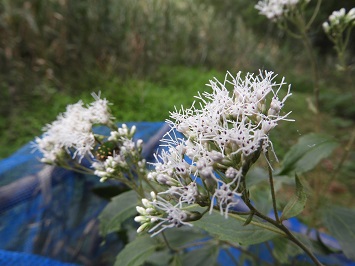
Goshawks Identified in the Biotope
In January, we identified goshawks, birds of prey and top predators. There were two goshawks when we identified them, who were thought to be a pair. Since goshawks begin nesting around January, they may have been looking for a place to build a nest. The fact that the goshawks, which are at the top of the ecological pyramid, were flying in this region indicates that the ecosystem in this region is stable and that our biotope is making a significant contribution to the preservation of biodiversity.
and resting in the pond.
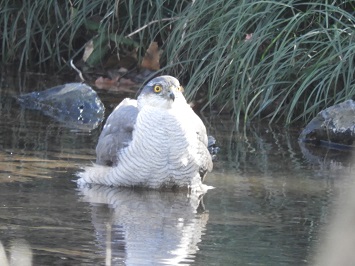
Article Published on Factory Management, A Magazine Published by The Nikkan Kogyo Shimbun,Ltd.
We contributed an article on our contributions in our biotope to the March 2024 issue of the industry magazine, FACTORY MANAGEMENT, published by the Nikkan Kogyo Shimbun,Ltd.. With "Using a large biotope to contribute to social sustainability" as its title, the article covered various initiatives, including the protection and cultivation of endangered plants, the calculation of carbon fixation rate, and the implementation of construction work to suck up the mud from the bottom of the biotope pond.